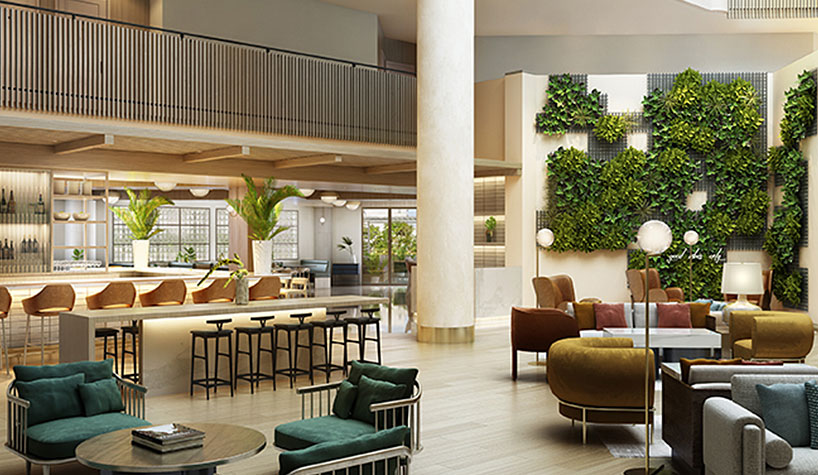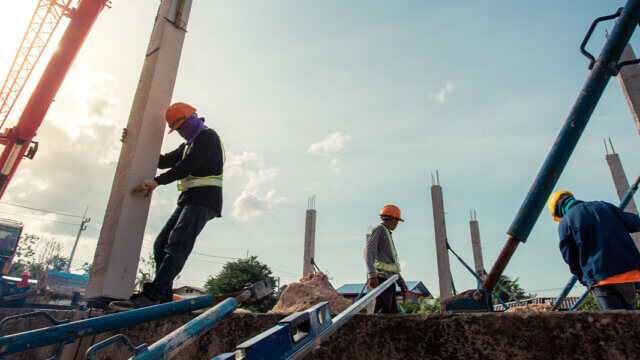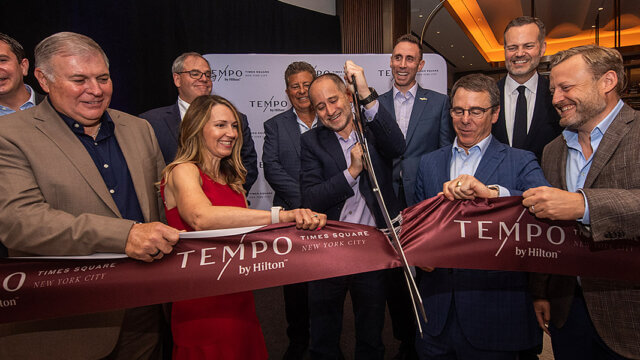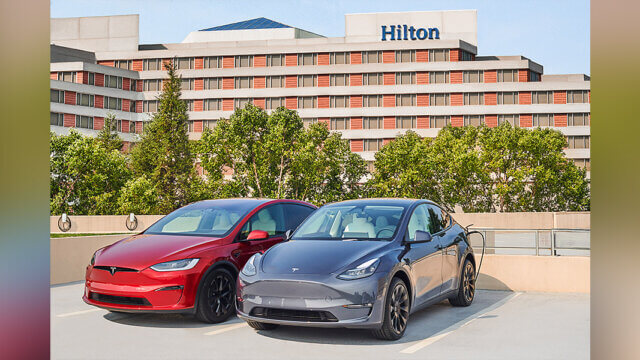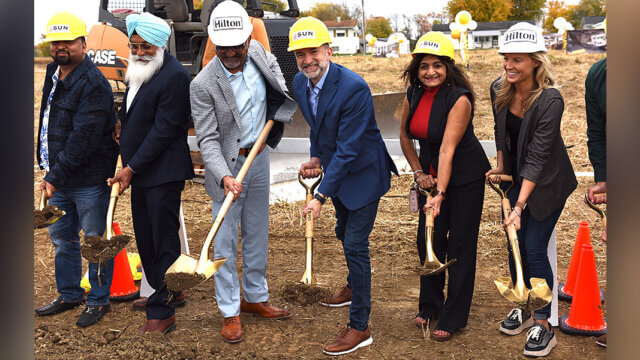It is no understatement to say that the COVID-19 pandemic has changed the hotel industry. The last year has forced the industry to think of new ways to reach and serve guests.
Hotel Business spoke with Matt Schuyler, chief brand officer at Hilton, about how, in just one year, the hotel industry has been changed.
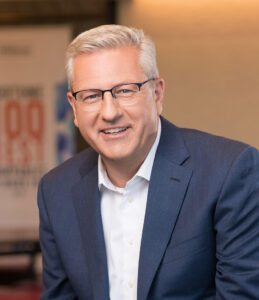 How important do you think it was that you took such a negative situation as the pandemic and brought some positives and innovations from it? When the pandemic took hold, our hotels faced a challenge unlike anything we’ve ever seen before. We are in an always-on business, with properties that function 24 hours a day, 365 days a year, but suddenly, when travel came to a screeching halt, many of our hotels had to suspend operations. This was literally unprecedented.
How important do you think it was that you took such a negative situation as the pandemic and brought some positives and innovations from it? When the pandemic took hold, our hotels faced a challenge unlike anything we’ve ever seen before. We are in an always-on business, with properties that function 24 hours a day, 365 days a year, but suddenly, when travel came to a screeching halt, many of our hotels had to suspend operations. This was literally unprecedented.
So, we had to make some quick decisions and move immediately. We had to find ways to make the best of the situation. That meant getting creative—and fast.
Here’s how we did that: First, we listened to our guests and customers. What were the things that would reassure them and make them comfortable staying and meeting in a hotel right now? The answers resulted in three new programs:
- We started by developing Hilton CleanStay, an industry-defining standard of cleanliness and disinfection in collaboration with RB, maker of Lysol and Dettol and in consultation with Mayo Clinic.
- Then, in direct response to our event planner partner needs, we introduced a global cleanliness and client service program specific to meetings and events called Hilton EventReady with CleanStay.
- Finally, later in the year, we created WorkSpaces by Hilton, a work-from-hotel solution for both corporate customers and individuals seeking office space to increase efficiency in their workday.
One of the biggest lessons we’ve learned since the beginning of the pandemic is that small innovations can make a big impact and that each team member can contribute in their own unique way. Through hotel design, for example, we can help guests reconnect with the natural world and create an environment that promotes wellness holistically. Our contactless technology allows guests to access most features of their stay directly through the Hilton Honors app, and our new industry-defining standard of cleanliness now gives guests added peace of mind throughout their experience in each one of our hotels.
At the same time, we also started asking different questions of our team members. What would make their experience safer and more efficient, particularly during times when many of their colleagues were furloughed? We quickly adapted to the virtual work environment and provided our team members on property with additional training and resources.
We also leaned into our values to navigate the tough decisions we had to make around our team member community. The year 2020 saw Hilton go from being named the No. 1 Best Company to Work for in the U.S. to, weeks later, having to furlough thousands of team members due to the impact of COVID- 19 on travel and tourism. This included activating Hilton’s Team Member Assistance Fund. This fund continues to support team members who have been directly impacted by the pandemic or have a family member impacted by the virus. We also had to reverse our recruitment engine to connect team members impacted by furloughs and layoffs with access to more than a million job opportunities through the Hilton Workforce Resource Center. In addition, we also recognized the heroic actions of frontline team members with the creation of a new Hospitality Heroes Award.
Finally, we looked at the communities in which we serve and found new opportunities to be part of the local solution. We started by partnering with American Express to donate up to one million hotel room nights across the U.S. for frontline medical professionals leading the fight against COVID-19. We then expanded that partnership through a $1 million contribution from American Express to World Central Kitchen to provide healthy, freshly prepared meals to frontline healthcare professionals who stayed at Hilton properties in cities across the U.S. during the pandemic.
In the last year, the pandemic has accelerated new thinking, something we describe as “a decade of innovation in just 12 months.” At Hilton, we know our entrepreneurial mindset in the face of adversity is only the beginning of long-lasting change for our company and across the industry, and we look forward to continuing to pave the way.
What was Hilton’s process for implementing these changes? To implement these changes as quickly as possible, we knew we needed to identify innovative and strategic partners, work with them on scalable solutions and find ways to bring those products and experiences to life at our hotels. For example, we saw an increased value in partnerships with other forward-thinking brands, such as Reckitt, maker of Lysol and Dettol, to create an elevated cleanliness program for our guests once they were ready to travel again.
These relationships, along with strong partnerships across our own enterprise, helped with the rapid creation and implementation of our industry-leading Hilton CleanStay program, rolling out just months after the pandemic began.
How did the pandemic evolve hospitality design? The pandemic prompted us to rethink how we used many elements of our hotels to meet the evolving needs of our guests, including our shared spaces, technology and food and beverage outlets.
Early in the pandemic, that included some immediate changes, such as shifting from buffets to creative grab-and-go food options. We also leaned into technology more to assist with new safety protocols. A good example of this was the increased focus on our contactless arrival experience and on our Hilton Honors app. The app better enabled guests to personalize their experience with the ability to choose their rooms; check-in and out digitally; and use their phones as digital keys. Guests have now used Hilton’s Digital Key to open more than 111 million doors worldwide since it launched in 2015.
Our hotel design has evolved at more macro levels as well. We know that humans crave social interaction and the freedom to socialize in a way that suits individual desires. In fact, it is integral to our emotional well-being. Now, more than ever, spaces need to give people choice to socialize (or not) in a way that they feel comfortable, which fueled our recent innovations in hotel design.
Within our lobby spaces, for example, we can create a range of environments which facilitate social connections and respond to those needs. As the central hub of the hotel and the first place the guest sees, lobby areas tell the story of how guest preferences have changed over time and how designers have responded. This crucial intersection is becoming a flexible hive of activity; a place where guests feel welcome and relaxed upon arrival, whether looking for a space to unwind while maintaining distance or a place to enjoy a drink in the company of others. Travelers are all at different places on the travel comfort spectrum, and our goal is to design spaces that meet them where they are.
Innovations to our hotel design are also made with wellness in mind. Recently, we’ve been aiming to take a more holistic approach to better address the needs of our evolving world. We found that the overall aspect of biophilia—connecting with nature, natural materials and light—is incredibly important. It helps to fight bacteria as it blurs the lines of indoor and outdoor space; we have been leaning into this throughout the pandemic.
We can see this at Canopy by Hilton Sao Paulo Jardins. Developed by architect Maria Magalhães, the hotel common areas embrace the local environment and outdoors and the spaces feel rich and welcoming due to the abundance of natural light and locally inspired palette comprising earthy tones and leathers.
In addition, we were already pushing for meeting spaces, lobbies and fitness areas to connect more with the outdoors before the pandemic, and are now seeing it as a great way to allow guests to connect with nature, while also providing a healing sense to the mind and body. When it comes to meetings and events, for example, planners are looking to take advantage of unique outdoor spaces as they focus more on the health and wellness of their attendees. For instance, Conrad New York Downtown is currently offering buyout options for their rooftop bar space, which will allow groups to have exclusive access to this location for the duration of their meeting.
How did the pandemic evolve technology and the contactless guest experience? As consumer expectations shift, so has Hilton’s approach to providing the best guest experience possible, and this means that future travelers will experience a digital transformation in hotels. We will always be in the business of people serving people. That said, the pandemic has proven that many guests appreciate the ability to use their smartphone as their key to check-in, going as far as being able to choose their room and walk straight to their room with no need to visit the front desk at check-in or checkout. These changes have been certainly well received and here to stay.
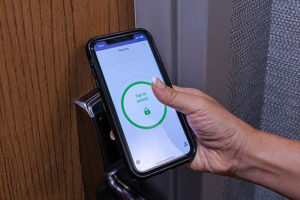 Prior to the pandemic, Hilton was already working on initiatives to expand the contactless functions of the Hilton Honors app, including Digital Key, which uses your smartphone to unlock your hotel door—and the pandemic quickly accelerated this initiative. Since its 2015 launch, Hilton’s Digital Key technology had expanded rapidly. It is now available to guests in an industry-leading 80% of Hilton’s more than 6,400 hotels in 45 countries around the world.
Prior to the pandemic, Hilton was already working on initiatives to expand the contactless functions of the Hilton Honors app, including Digital Key, which uses your smartphone to unlock your hotel door—and the pandemic quickly accelerated this initiative. Since its 2015 launch, Hilton’s Digital Key technology had expanded rapidly. It is now available to guests in an industry-leading 80% of Hilton’s more than 6,400 hotels in 45 countries around the world.
In addition, our in-room technology enables guests to personalize and control every aspect of their stay from one central point—their mobile device and the Hilton Honors app. Guests who stay at in-room technology-enabled properties will be able to personalize their preferences from popular streaming media, such as Showtime, Netflix and iHeartRadio, further shifting and expanding future guest experiences.
How did the pandemic change the emphasis on cleanliness? Built upon the already high standards of housekeeping and hygiene, Hilton CleanStay was announced shortly after the pandemic began and defined Hilton’s new industry-leading, elevated standard of cleanliness and disinfection in hotels around the world.
To meet evolving consumer expectations during the pandemic, the goal of Hilton CleanStay was to provide guests with assurance and peace of mind when they stay at any of Hilton’s more than 6,400 properties, so we focused on elevated cleanliness standards of their entire stay—from restaurants to fitness rooms and other public spaces.
In collaboration with Reckitt, Hilton developed elevated cleaning and disinfection processes and team member trainings. Reckitt brought key talent and Lysol experts in hygiene and disinfection to the multi-year partnership, leveraging more than 130 years of science-based research and thought leadership to support awareness, training and education, and product delivery and systems. Throughout the elevated cleaning processes, hotel team members were provided with personal protective equipment and enhanced training designed to protect their wellbeing.
Hilton CleanStay hotel brand standards include the Hilton CleanStay room seal, 10 high-touch deep-clean areas, the removal of paper amenities, improved guidelines for disinfecting hotel fitness centers, increased frequency of cleaning in public areas, disinfecting stations for guests and contactless check-in with Hilton’s Digital Key technology.
How did the pandemic reimagine dining and other F&B? The pandemic has taught all of us in the industry how to rethink, reimagine and continue to reconsider how we can best provide a service for our guests. Throughout the pandemic, we continued to push food & beverage innovation so that when hotels are fully occupied again, guests will not only experience what they have come to know and love, but they will also be introduced to brand-new experiences, products and offerings.
Additionally, as COVID-19 restrictions caused a shutdown for indoor dining, like many other food and beverage establishments, we began utilizing the outdoor spaces at our restaurants to serve our guests. As the weather becomes nice again and outdoor dining is still permitted, we know there will be an increase of people going out to eat.
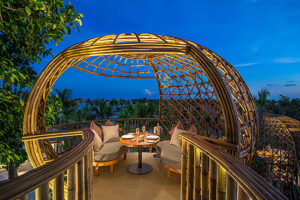 In addition to other changes to our food and beverage offerings, we’ve made adjustments to the room service experience, particularly at our full-service brands. Room service at our full-service brands is still available, but how we deliver it is changing for now. Instead of a rolling cart or traditional tray, delivery is provided in a contactless way, where a team member will deliver it to your door in a custom bag with single-use service ware. The team member will place the bag outside the guestroom door, knock and then the guest can retrieve it when ready. Our goal is to minimize physical contact while keeping room delivery quick and delicious.
In addition to other changes to our food and beverage offerings, we’ve made adjustments to the room service experience, particularly at our full-service brands. Room service at our full-service brands is still available, but how we deliver it is changing for now. Instead of a rolling cart or traditional tray, delivery is provided in a contactless way, where a team member will deliver it to your door in a custom bag with single-use service ware. The team member will place the bag outside the guestroom door, knock and then the guest can retrieve it when ready. Our goal is to minimize physical contact while keeping room delivery quick and delicious.
As we see warmer weather and outdoor dining continues to be permitted, we also anticipate there to be a huge influx of people going out to eat and enjoying drinks. For this reason, a variety of our hotels have been placing an emphasis on outdoor dining experiences. The outdoor garden at ShadowRock Tap + Table, for example, located at Hilton Sedona Resort at Bell Rock, now offers igloo dining. Each igloo can accommodate up to six guests, making them perfect for bridal brunches, garden parties, dinners, after-hour cocktails and everything in between—allowing guests to be social in their own circles, while remaining socially distant from others. These new offerings will continue to enhance our overall food and beverage programs, but as part of a much larger and enriching in-person experience.
How did the pandemic create a focus on comfort travel? A familiar name like Hampton by Hilton, DoubleTree by Hilton or Homewood Suites by Hilton has never been more important to many travelers. Many people are out of practice in traveling, and they look to a trusted brand to help them get back into the habit. To bring comfort to our guests in the time of the pandemic, Hilton has placed an emphasis on programs, such as its Digital Key and contactless check-in, enhanced booking flexibility, additional training for team members on the latest health and safety protocols and new approaches to fitness centers and dining. And To New Memories, Hilton’s first major marketing campaign since the pandemic began, was designed to remind people of what they love about travel and reassure them that Hilton and each of our hotels will be prepared when guests are ready to return.
How did the pandemic evolve events and meetings? During the pandemic, event planners from around the world shared that they were looking for innovative solutions for the entire event experience, from flexibility in planning and physical distancing protocols to transparency in cleanliness policies—and that is what we have delivered.
To establish safe group travel practices, we introduced a global cleanliness and client service program specific to meetings and events called Hilton EventReady with CleanStay. In January, the constantly evolving program led to the introduction of Hilton EventReady Hybrid Solutions, a suite of offerings that directs event planners to our hybrid-ready hotels while also providing them with planning resources—including an expanded Hilton EventReady Playbook and flexible customer offers.
At Hilton, we know there is no replacement for the value of in-person events and that business, networking and relationships are all formed and strengthened when we can be together face-to-face.
How did the pandemic evolve loyalty? During this truly unexpected, turbulent time we wanted our Hilton Honors members to know that we are loyal to them just as they have been loyal to us. When our guests could not travel, we decided to make changes to our program that show our commitment to our members such as cutting the status qualifications in half, lowering milestone bonus night thresholds and extending the free weekend night reward certificate expiration dates for Hilton Honors American Express card members.
Other modifications included automatically extending point expiration dates and status, and rolling out 2021 program changes to provide greater flexibility for Hilton Honors members. This commitment to flexibility and value will continue to meet the needs of our ever-changing world.
Do you think that many of the changes that came about because of the pandemic are long-lasting or only temporary? Which ones do you think will last? At Hilton, we believe the impact of the pandemic on hotels will continue to evolve with consumer preferences. While the pandemic already has changed the way people travel and meet, our innovations such as contactless technology, enhanced cleanliness protocols and hybrid event solutions not only created improved systems to address the pandemic but have heightened expanded guest experience for many years to come.
As we continue to meet the changing expectations of today’s fast-paced environment, we plan to enhance the protocols and programs that we have already set in place and produce new innovations to create even better guest experiences and products. But even with all these changes, one thing will always remain constant here: Our Hilton hospitality.
Is there anything else you would like to add? We know the success of our business is linked to our ability to operate and grow sustainably. As one of the world’s largest hotel companies, we recognize that we have a critical responsibility to protect our communities and our planet, so the destinations where we operate can remain vibrant and resilient for generations of travelers to come. We also remain committed to building a strong workplace culture for our team members, because we know that if our people are happy, they are better able to care for our guests. We’re proud to continue to see evidence of our strong culture. In April 2021, Great Place to Work and Fortune named Hilton the No. 1 Best Big Company to Work For and No. 3 on the list of Best Companies to Work For in the U.S. We also continue to top the list of many other countries, including the U.K., Canada and Argentina.
That’s why, even in the face of immense pressure and hardship, Hilton remains committed to its Travel with Purpose 2030 goals. The recent release of our 2020 ESG Report illustrates our ongoing commitment to doubling our investment in social impact and cutting our environmental footprint in half, while also supporting efforts to create a better world to travel through the Hilton Effect Foundation.
At Hilton we have stay true to our founding vision—to fill the earth with the light and warmth of hospitality. More than ever, the global community is relying on the private sector to lead the way in building resilience and inclusive growth in a complex world, and that’s why we are determined to stay on course when it comes to our sustainability practices.
